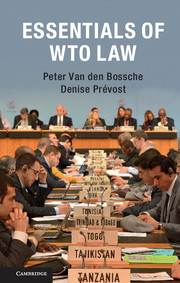Book contents
- Frontmatter
- Contents
- List of figures and tables
- Preface
- List of abbreviations
- Table of cases
- 1 International trade and the law of the WTO
- 2 Rules on non-discrimination
- 3 Rules on market access
- 4 Trade liberalization and other societal values and interests
- 5 Rules on unfair trade
- 6 Rules regarding harmonization of national regulation
- 7 The institutional aspects of the WTO
- 8 The WTO dispute settlement system
- Online resources
- Index
- References
2 - Rules on non-discrimination
- Frontmatter
- Contents
- List of figures and tables
- Preface
- List of abbreviations
- Table of cases
- 1 International trade and the law of the WTO
- 2 Rules on non-discrimination
- 3 Rules on market access
- 4 Trade liberalization and other societal values and interests
- 5 Rules on unfair trade
- 6 Rules regarding harmonization of national regulation
- 7 The institutional aspects of the WTO
- 8 The WTO dispute settlement system
- Online resources
- Index
- References
Summary
Prohibition of discrimination
The prohibition of discrimination is a key concept in WTO law and is often the subject of trade disputes between WTO Members. This prohibition finds expression in two obligations:
• the most-favoured-nation (MFN) treatment obligation; and
• the national treatment obligation.
In simple terms, the MFN treatment obligation prohibits discrimination among goods, services or service suppliers of different foreign origins (or with different foreign destinations).
The MFN treatment obligation entails that Agricola, a WTO Member, may not grant more favourable treatment to smartphones from Industria than to smartphones from Alpinia, or treat Alpinian doctors less favourably than Industrian doctors.
The national treatment obligation prohibits discrimination between foreign goods, services and service suppliers and domestic goods, services and service suppliers.
Under the national treatment obligation, WTO Member Agricola may not treat chocolate from Industria less favourably than it treats its domestic chocolate, once the chocolate from Industria has entered the Agricolan market. Neither may Agricola treat Industrian coffeehouses established in Agricola less favourably than Agricolan coffeehouses.
The most important non-discrimination rules in the WTO Agreement are:
• Article I of the GATT 1994 (MFN treatment obligation for trade in goods);
• Article III of the GATT 1994 (national treatment obligation for trade in goods);
• Article II of the GATS (MFN treatment obligation for trade in services); and
• Article XVII of the GATS (national treatment obligation for trade in services).
The WTO Agreement also contains other non-discrimination provisions, such as Articles 3 and 4 of the TRIPS Agreement concerning the MFN treatment obligation and national treatment obligation for the protection of intellectual property rights. These provisions will not be discussed further in this short overview of the prohibition on discrimination in WTO law.
The MFN treatment obligation concerning trade in goods
Article I:1 of the GATT 1994 contains the MFN treatment obligation concerning trade in goods. The principal purpose of the MFN treatment obligation of this Article is to ensure all WTO Members equality of opportunity to export to or import from other WTO Members.
In EC – Seal Products (2014), the Appellate Body ruled that Article I is ‘concerned, fundamentally, with prohibiting discriminatory measures by requiring …
- Type
- Chapter
- Information
- Essentials of WTO Law , pp. 13 - 48Publisher: Cambridge University PressPrint publication year: 2016



